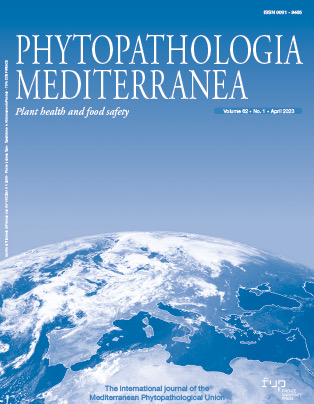Virulence of Puccinia triticina and Puccinia tritici-duri on durum wheat in southern Spain, from 2020 to 2022
Published 2023-04-06
Keywords
- Leaf rust,
- virulence,
- resistance,
- telia
How to Cite
Copyright (c) 2023 Jaime Nolasco RODRIGUEZ VAZQUEZ, Karim Ammar, Ignacio SOLIS, Fernando Martinez-Moreno

This work is licensed under a Creative Commons Attribution 4.0 International License.
Abstract
Leaf rust is a major wheat disease in southern Spain, where durum wheat is an important crop. Until the 2019/2020 season, this disease was effectively managed, as the most widely planted cultivars in southern Spain had effective resistance genes. A problem arose in the spring of 2020, when every farm field and durum wheat trial examined displayed leaf rust symptoms. Leaves had few but large uredinial pustules, different from those of the normal leaf rust caused by Puccinia triticina, and telia developed rapidly after only a few days. The symptoms clearly fitted with P. tritici-duri, another wheat leaf rust species already reported in the western Mediterranean Basin. This species is not new in southern Spain but has never been observed at such high severity on almost every durum wheat cultivar grown in that region. Leaf rust severity was assessed in durum wheat field trials in the 2020, 2021 and 2022 growing seasons in four provinces of southern Spain. During 2020 and 2021, 13 single pustule isolates of leaf rust were also collected from different cultivars of durum wheat. Inoculation of the isolates on a differential host set showed that four different races were present, two being of P. tritici-duri. Only cultivar Calero showed consistent resistance to the races of P. tritici-duri employed in this study.
Downloads
References
D’Oliveira, B., and Samborski, D.J. 1966. Aecial stage of Puccinia recondita on Ranunculaceae and Boraginaceae in Portugal. Pp. 133–150. Proceedings of Cereal Rusts Conferences, Cambridge, United Kingdom.
Ezzahiri, B., and Roelfs, A.P., 1992. Anchusa italica as an Alternate Host for Wheat Leaf Rust in Morocco. B. Ezzahiri. Plant Disease 76:1185. DOI: 10.1094/PD-76-1185A.
González-Fragoso, R., 1918. La roya de los vegetales. Publisher: Junta para Ampliación de Estudios e Investigaciones Científicas (Imp. de Fortanet, Libertad 29), Madrid, Spain, 267 p.
Kolmer, J.A., and Hughes, M.E. 2017. Physiologic specialization of Puccinia triticina on wheat in the United States in 2015. Plant Disease 107: 1496–1506.
MAPA (Ministerio de Agricultura, Pesca y Alimentación), 2022. Available at: https://www.mapa.gob.es/es/
Martínez–Moreno, F., Solís, I., 2019. Wheat rust evolution in Spain: an historical review. Phytopathologia Mediterranea 58(1): 3–16. doi: 10.13128/Phytopathol_Mediterr-22561
Stakman, E.C., Stewart, D.M., Loegering, W.Q., 1962. Identification of physiologic races of Puccinia graminis var. tritici. United States Department of Agriculture, Agricultural Research Service, E617, Minnesota, USA, 54p.






